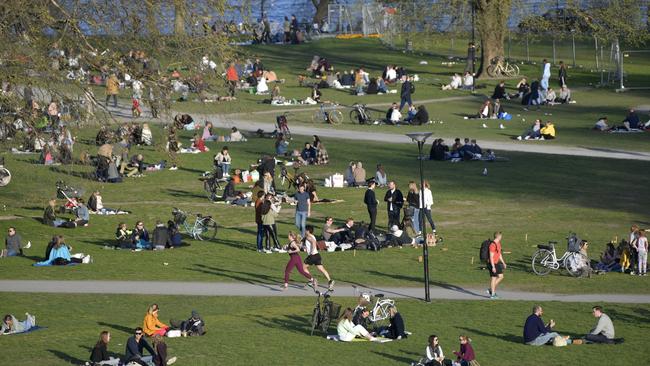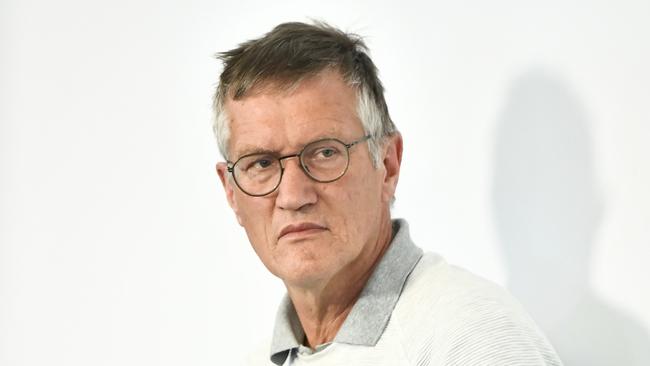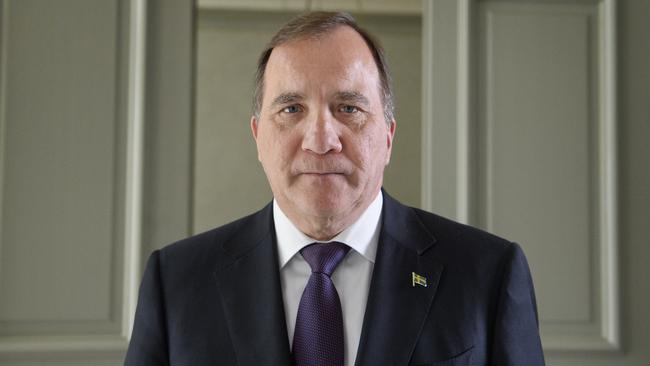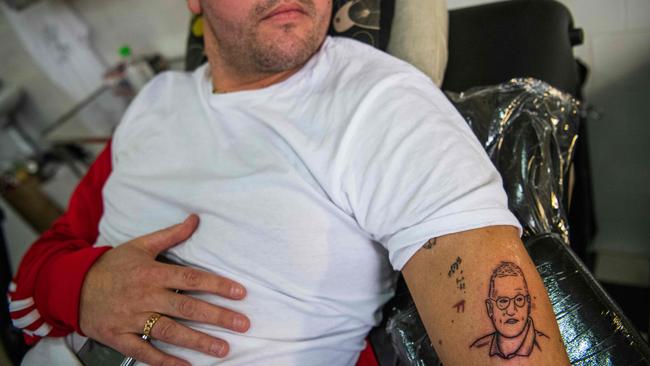Going it alone: why Sweden didn’t fully lock down
Epidemiologist Anders Tegnell has led a response to coronavirus in Sweden that has earned him devotion and rancour across the world. Does he now regret it?

The Democratic Republic of the Congo, 1995. An ebola outbreak has just been declared. Anders Tegnell, a Swedish epidemiologist, is sent to the capital, Kinshasa, to help with the response. Panic is widespread, the relief operation is a mess, people are dying. No one knows what they’re meant to do, and competing directives from different agencies adds to the confusion. Sound familiar?
In the end, the ebola outbreak was suppressed and Tegnell went home to resume his very ordinary, office-based life in Stockholm, forming Sweden’s public health policy. But he had learnt an important lesson: when crisis strikes, people die if officials do not communicate properly.
Twenty-five years later, Tegnell is a key figure in another pandemic. At 64, he is directing a response to coronavirus in Sweden that has earned him devotion and rancour across the world. This is because, unlike just about everywhere else, Sweden has not enforced a full lockdown, instead relying on people to observe social distancing and stay home if they’re sick. Schools have remained open for under-16s, while colleges and universities have been closed. Gatherings of more than 50 people are banned, but many restaurants and bars are open – albeit with social distancing measures (you can be served at a table, but not at the bar).
This approach, Tegnell believes, will allow the virus to spread slowly through the healthy population (I am Swedish, and experienced this first-hand when I contracted COVID-19 at a punk gig in Malmo). The idea is that this should cause immunity to rise, thereby protecting Sweden from a second, potentially more lethal, wave of infection.
It hasn’t been quite that simple, though. Almost 4000 people have died in Sweden, far more than in neighbouring countries (both in total and on a per capita basis). During one week in May, deaths per capita overtook every other country in Europe, according to the Our World in Data website. By the end of April, only 7.3 per cent of people in Stockholm had developed antibodies needed to fight the disease; nevertheless, Swedish health officials believe their approach will work in the long run. As transmission rates fall, a return to something like normality might be in sight. The death rate is declining and, overall, Sweden has had fewer deaths per capita than the UK, Italy and France, which all enforced lockdowns. Should those countries have acted like Sweden?

“I don’t know,” Tegnell says. “They did the necessary things at the stage where they were, when they saw things coming apart. But maybe they should have had a bit more of, what we say in Swedish, ice in their stomach.” In these weird, uncertain times, having ice in your stomach can put you on a fine line between being bold and heartless. Yet as politicians falter in the face of a wildly complicated and deadly challenge, scientists have become celebrities. Tegnell himself has been fetishised by large chunks of the Swedish population. On his birthday there were toasts to him around the country.
Despite the high death toll, surveys have found that Swedes aren’t particularly afraid of catching Covid-19. Perhaps some of that is down to Tegnell’s strategy of communicating calm, accountable stability rather than making statements about overcoming adversity (Italy) or pushing metaphors about war (the UK). “In Sweden we know that trying to scare people is not a good way forward when you want something,” he says. “You need to inform people and give them a good background to make their own informed choices.”
Swedes pay high taxes because we believe the state will protect us. Given the widespread trust in the state, is there a worry that people might back him whatever he is doing? “No,” he groans. “People are not stupid. They trust us because we give a good explanation of why we’re doing things.”
Even so, for Tegnell and his colleagues, the stakes are high: should they fail, thousands more could die and one of the cornerstones of the national character could crumble. “Trust is very easy to lose and very, very difficult to rebuild, so it’s important for me and our agency to keep that,” he says. “But you need to do it by being incredibly transparent, admitting your mistakes and admitting when you have made the wrong choices very quickly and openly, and move on.”
Mistakes, of course, have been made – mistakes that have cost lives. About half of Sweden’s fatalities have been vulnerable older people living in aged care homes that arguably could have been better insulated from the virus. Does he feel responsible? He sighs and sounds genuinely upset when he answers. “I’ve lost – we’ve all lost – people in our older generation and this is a terrible thing that happened. And we are really trying to do our best so that this will happen to as few people as possible.”
Despite his conviction that the public health agency made the right decision with the information it had at the time, he has since acknowledged the approach will have to be examined because there is “quite obviously a potential for improvement in what we have done”. “If we were to run into the same disease, knowing exactly what we know about it today, I think we would end up doing something in between what Sweden did and what the rest of the world has done.”
Yet how did we even end up here? Sweden is better known for its nanny state than for its commitment to personal freedoms. Almost all our alcohol, for instance, is sold by state depots during tightly regulated hours. So when did we become libertarians? The Swedish coronavirus policy is easier to understand once you realise that this was the plan all along. Norway, the Netherlands and – for those with long memories – the UK all had contingency plans similar to what Sweden is doing today. Why, then, did those other countries switch to harsh lockdowns? Did they panic?
“To a certain extent I think they did,” Tegnell says. Was he tempted to follow, when they started changing their strategies? “Not drastically like that. We continually look at how we can adapt and get better. But this sort of total turnaround, we’ve never been close to that.”

Stefan L ö fven, the prime minister, recently expressed concern that Sweden was being cast as the odd one out, describing the fight against Covid-19 as “a marathon”. He argued that his country’s approach will come good over the long term and that Sweden will suffer less, economically and socially, than other countries. But as the death toll rises, so does the pressure to change course. In April, 22 scientists accused health authorities of aiming to achieve herd immunity without admitting it. They described the policy as dangerous and unrealistic, and called for a shift.
But Tegnell seems to take pride in rejecting measures he thinks aren’t beneficial, even though everyone else is adopting them. Take masks, for instance. While many other countries have made them mandatory in public spaces, Tegnell says there is not enough proof that they are effective outside non-clinical environments. But why not do it anyway, if there’s a chance it could save lives?
“We don’t think [that approach] could save lives. It actually could cause a loss of life if it’s not used in the right way,” he says. “We’re talking about risks that these masks will not be available for healthcare because they’ll disappear. Furthermore, in Sweden we say if you’re ill, stay home, isolate yourself... if we’re telling people to use a face mask, they would put one on and then they would go out and infect more people than if they’d stayed home and isolated themselves.”
Could the Swedish approach have worked elsewhere? Clearly the country is atypical: lots of cash, a small population spread over a large area, a well-developed health system and a good baseline of public health. “There are parts of the Swedish model that could work in many countries. If you look at a lot of the exit strategies that have developed, now it looks like a lot of countries are pretty much closer to the Swedish models,” Tegnell says. “Because you need to have some kind of softer restrictions. You can’t go on having schools closed. That does terrible things to children. And you can’t go on having borders closed, that does terrible things to the economy. So then you try to find another way of keeping social distancing in place.”

How does he think the “curve” of the infection rate would have looked in, say, the UK without a lockdown? “At the end of this we might look at each other and realise, no, whatever we did didn’t make much of a difference,” he says. “And the Swedish model or the British model or the Dutch model, all of them in the end they just took a shorter or longer time, and the effects on society and economy was different. But the health consequences might be very similar in the end.”
He has been spending his limited free time gardening and pottering about his farmhouse, where he lives with his wife of 39 years. He gets hundreds of emails every day – most of them, he claims, positive – thanking him for his work, although there have been reports of death threats. His predecessor Annika Linde has broken her silence to criticise the response. But Tegnell claims no one shouts at him in the street. Don’t people ever tell him he’s doing a rubbish job? “No, not to my face.” This might, I say, be less because people like him and more because Swedish people are so conflict- averse. He takes a moment to think about this, then agrees. “Maybe in another country it could have been different,” he says.


To join the conversation, please log in. Don't have an account? Register
Join the conversation, you are commenting as Logout